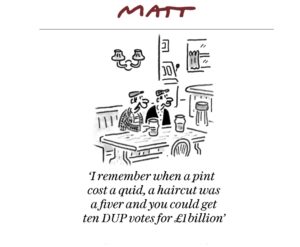This morning’s Observer column:
When Donald Trump first appeared on Twitter, two thoughts came to mind. The first was that he was an absurd candidate for the presidency. The second was that he had a remarkable intuitive understanding of the possibilities of 140-character discourse. In a public lecture some time after his election, I rashly opined that “Trump is to Twitter as Michelangelo is to sculpture”.
As ice formed on the upper slopes of my (predominately liberal) audience, I realised that this was not a tactful observation. Michelangelo’s genius, one infuriated listener pointed out, was deployed in creating uplifting works of art, whereas Trump’s tweets merely plumbed the depths of human nastiness. Which was spot on. But it nevertheless remained true that Trump is surpassingly good at what he does, which is polluting the public sphere, infuriating his opponents and pandering to the inner demons of his supporters.
When he took office, many people assumed that he couldn’t go on like this: governing by tweet. Trump has begged to differ…

